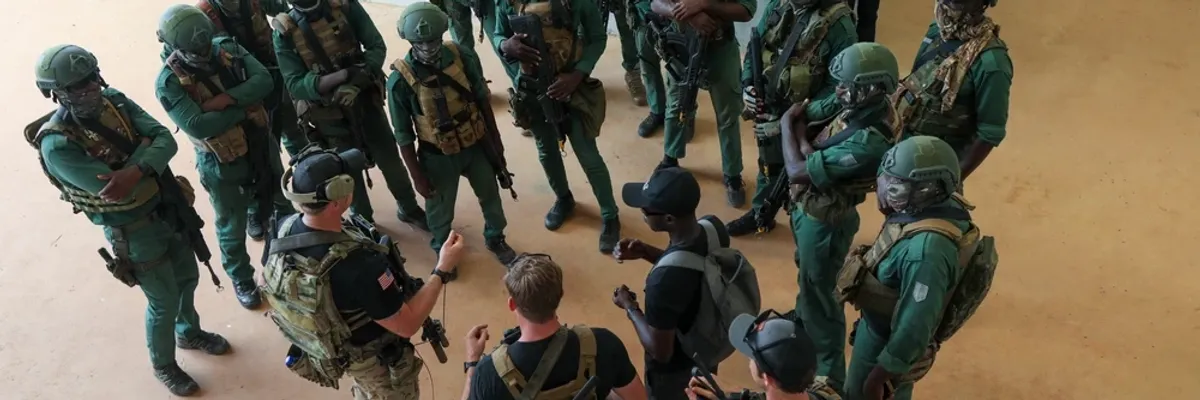The U.S. military’s annual Exercise Flintlock, a training exercise for militaries from West and North Africa, was held late last month in Ghana and Cote d’Ivoire. First held in 2005, Flintlock includes both “academic” and “tactical” training and is meant to help African militaries work better with one another.
The exercise is not only a training, however; it is also a kind of performance that frames West Africa’s problems, real and anticipated, as requiring primarily military solutions. Heavily mediatized and often covered quite sympathetically by journalists, Flintlock provides a stage from which Pentagon officials call for more resources. But the Pentagon’s framing of the situation in West Africa sits uneasily with official strategies emanating from the White House, setting up significant potential for remarkable incoherence in American messaging and policy implementation.
This year’s Flintlock wrapped up just days before Vice President Kamala Harris’s visit to Ghana (as part of a tour that also includes stops in Tanzania and Zambia). One goal of Harris’s stop in Ghana was to announce a new plan, as well as new funding, for conflict prevention in the Sahel region and in coastal West Africa. The new plan, “The U.S. Strategy to Prevent Conflict and Promote Stability 10-Year Strategic Plan for Coastal West Africa,” comes with an initial $86 million in funding for the first three years, along with over $14 million more for additional conflict prevention efforts.
The new plan bluntly states, “This 10-year plan is explicitly crafted to incorporate lessons learned from overly securitized approaches to addressing [Violent Extremism]-related challenges in the Sahel region over the past decade.” The plan further seeks “to reinforce and buttress promising national commitments by the five governments to address VE-related challenges in a more holistic fashion, emphasizing inclusive development and responsive governance.”
What, then, to make of Flintlock? Here is how the New York Times opened its coverage of this year’s exercise: “Troops clad in black jumped out of motorboats near a riverside resort and made their way along a wood-slat fence to their objective: a building where terrorists had seized a high-level government official.” The training included sessions on the rule of law and sought to promote collaboration between militaries and judiciaries, but that opening image — that this is ultimately a fight where daring special forces will be facing down hardened operatives from al-Qaida and the Islamic State — seems deeply ingrained in the minds of both American and West African military officers.
In reality, however, such dramatic scenarios of urban terrorism have occurred only sporadically in the region; it is the day-in, day-out drumbeat of rural raids on security forces and provincial towns and villages that has sapped regional militaries’ morale, elicited abusive and disproportionate reprisals from soldiers, and provoked military coups. Most soldiers aren’t going to be rescuing a minister from al-Qaida; they’re going to be trying to decide who’s a threat and who’s not in a village where civilians are frightened and suspicious.
Meanwhile, the southward spread of jihadism from the Sahel into West Africa is real, but it’s far more complex than one would glean from Flintlock or from the U.S. media coverage of the exercise.
The Wall Street Journal covered Flintlock briefly in the context of a longer report on intercommunal conflicts in northern Ghana, trends that many observers fear are creating a growing opening for jihadists. The Journal writes that the U.S. “is desperately trying to establish a firebreak” between the Sahel and coastal West Africa — in a section that comes just before two photos captioned, respectively, “Ghanaian commandos train by conducting a mock raid on a terrorist-occupied village” and “Ghanaian special-operations troops trained by U.S. commandos practice at a firing range in Daboya, Ghana.”
The notion of a “firebreak,” and the imagery of raids and bullseyes, are clearly in tension with the new strategy, whose three objectives include strengthening “social cohesion,” improving “government responsiveness, inclusion, and accountability,” and enhancing “security force responsiveness and accountability.” The U.S. government seems to be having trouble deciding whether Western African militaries simply have to get better a kicking in doors, or whether a genuinely new approach is needed.
Defenders of Flintlock might counter that improving West African militaries’ tactical prowess supports the wider objectives of the new strategy, and that the training is not merely tactical but also academic. “The week of academic instruction included sessions on the law of armed conflict, which covered concepts like proportional use of force and the protection of civilians,” the Times emphasized in its frankly wide-eyed report illustrated by multiple photos of trainees in action.
The problem, however, is that the valorization of military training reinforces some of the habits and assumptions that, as the White House’s strategy itself says, failed in the Sahel over a decade and more. That failure is evident from the history of Flintlock itself.
Let’s flash back to 2010, for example, when jihadists had a much sparser presence in the region. Here’s how one report opened: “A platoon of commandos from Mali and Senegal are scaling a building’s edifice, one handful of rope at a time” — yet another hostage rescue scenario. That year, an American officer told journalists in attendance, “Our focus is on basic tactical military techniques … and helping to build capacity in our partner nations. Success for us is putting us out of a job.”
Thirteen years later, Flintlock is little changed — and the overemphasis on tactical training and “counterterrorism” undercuts any attempted pivot away from a militarized U.S. approach to the region.















